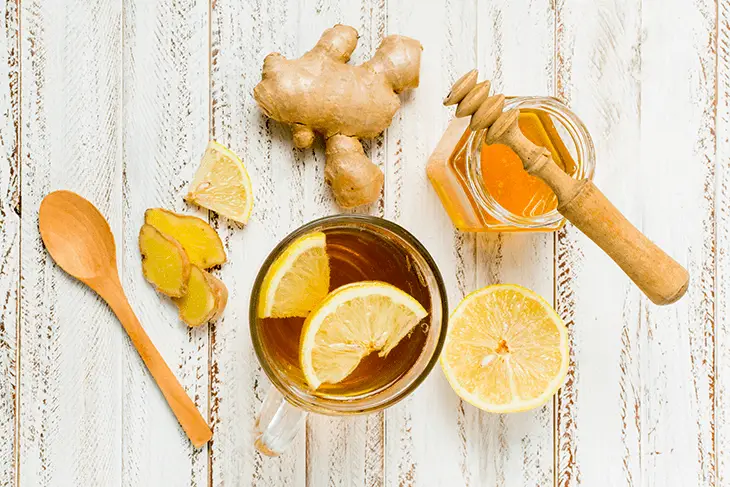
True and herbal teas are rather beneficial for an upset stomach, but you must be aware of the most useful options.
Quite a few of my clients prefer the natural approach to common ailments. This is why I am often asked to recommend tea for upset stomachs. This is a more complex process than people realize.
In this post, I show you which brews to turn to as well as the do’s and don’ts of utilizing this remedy. Let’s get started!
Contents
Now you are aware that each type of tea – both true and herbal – has its own set of useful ingredients. Thus, to alleviate a particular symptom of a stomach upset, you need to know precisely which tea to drink. The following guide will help you out:
Most people are aware that green tea can be an incredibly healthy beverage. In particular, it can have a real impact on your gut health. This is especially true if you suffer from chronic gastritis – drinking green tea can help to alleviate this condition quite a bit. In doing so, it may just be able to reduce your risk of stomach cancer as well.
There is also some evidence to suggest that green tea can work to heal stomach ulcers. As a result, you should experience relief from stomach aches, gas, and indigestion. This is especially true if you tend to experience ulcers as a consequence of chronic gastritis.
In a study conducted, green tea was given to patients suffering from diarrhea as a result of their radiation therapy. There was a significant decrease in the associated symptoms once patients began drinking the beverage. However, it wasn’t specified if the same effect could be seen in individuals who weren’t undergoing radiation treatment.
You can use loose tea leaves or tea bags to brew this tea. If you are brewing loose tea, you can use 2 grams of tea leaves for every 8 ounces of water. For tea bags, add one bag for every 8 ounces. Steep the leaves in water that has been allowed to cool after boiling. Make sure to only steep the leaves for around 30 to 60 seconds.

When most people think of chamomile tea, they focus on the calming properties of the drink. It turns out, though, that the beverage is an excellent stomach soothing tea. In particular, chamomile tea has shown to be useful against flatulence and gastrointestinal irritation. It can be used to treat a variety of digestive disorders as well.
What’s more, you can drink this tea for diarrhea treating purposes as well. Throughout history, it has been used to treat the symptoms of this condition in children. Further research shows that it could help most people with this issue.
For this drink, you can use fresh chamomile flowers or a tea bag. If you’re using fresh flowers, then a handful will do. If it’s a teabag, use a single one. Place the flowers in 8 ounces of boiling water and let it steep for around 5 minutes. For bags, follow the provided instructions.
Related Article
Find Your Zen with the Best Chamomile Tea
Peppermint tea has long been used to calm a disruptive gut. Now it appears that the research backs this up. It should be noted that much of the studies were done on peppermint oil. However, it stands to reason that peppermint tea would have a similar effect.
There is a good chance that peppermint is a good tea for stomach ache. The oil has been shown to help alleviate pain and discomfort in children. Simply the smell of the tea alone can help to dissipate feelings of nausea.
As for the peppermint tea itself, animal studies show that it can relax gastrointestinal tissues. At the same time, the drink appears to have strong antimicrobial and antiviral properties and may help to alleviate stomach conditions caused by bacteria and viruses.
For a fresh cup, use half a handful of torn peppermint leaves. Allow this to steep in 8 ounces of boiling water for around 5 minutes. If you are using a tea bag, you may need to steep it for a shorter period. Always follow the instructions to avoid a bitter brew.
Ginger tea is yet another common remedy for a number of stomach ailments. What is especially helpful about this beverage is that it is a tea that helps with nausea. What’s more, pregnant women can safely use it to help curb morning sickness.
It is also excellent if you want to regulate your bowel movements. Ginger tea encourages gastric emptying and can even stimulate certain muscles in the digestive system. As a result, you can also reduce the risk of indigestion.
Furthermore, ginger tea may also be able to help with stomach cramps, excess gas in the stomach, and bloating. So, you should be able to solve quite a few problems with this one brew.
It is best to use fresh ginger for tea. You can use thin slices or finely chopped up ginger. Add two tablespoons for every one cup of water. Bring the water to a boil in a pan and then take it off the heat. Add the ginger and allow it to steep for around ten minutes.

A number of cultures around the world add fennel seeds to food to improve digestion. However, drinking fennel tea is a good enough substitute and can treat quite a few different stomach disorders.
To begin with, fennel tea can be quite helpful to individuals who have just undergone gynecological operations. It can reduce flatulence and promote healthy bowel movements.
Fennel extract is quite helpful to women who are suffering from nausea as a result of dysmenorrhea. While this was a limited sample, it is quite possible that fennel tea can help to reduce the feeling of nausea in others as well.
Fennel can also block the actions of various bacteria such as E. coli. Not only is this a rather widespread bacteria, but it is also quite troublesome. So, drinking fennel tea regularly could lower your risk of various stomach-related diseases.
You should use dried fennel seeds for this drink. Crush the seeds and place them in an enclosed tea strainer. Measure between one and two teaspoons of seeds for each cup of water. Once the water has boiled, allow the fennel seeds to steep for 5 to 10 minutes.
If you are someone that suffers from indigestion rather frequently, then you will be pleased to learn that licorice tea can help to soothe many of the symptoms. Within a short period of time, you will be able to get rid of heartburn, regurgitation, upper abdominal discomfort, and belching.
If you are at risk of peptic ulcers, research suggests that licorice tea could act as an anti-ulcer drug. This means that with a controlled dosage, you could effectively avoid ulcers. At the very least, you will be able to cure them faster.
It should be noted that high amounts of licorice tea can actually be dangerous. This is why most experts will advise you to stick to one cup of tea a day.
For this tea, you will need dried licorice root. Use one teaspoon for every four ounces that you plan on drinking. Once the water has boiled, place the dried licorice root in the water and allow it to steep for around 4 minutes.
Another tea that is incredibly helpful with ulcers is holy basil tea. This isn’t a drink that is commonly consumed. Nonetheless, it can be used to effectively prevent the occurrence of stomach ulcers. Of course, the tea can be used as a remedy for ulcers as well. They can actually facilitate healing quite a bit.
You can use dried holy basil powder or tea bags to brew a cup. To begin with, a teaspoon of powder added to a cup of water will do. Follow the instructions for the best brewing time.
In many cultures, people with stomach issues are often put on a strict diet of plain black tea. There is now science that backs this up. In fact, you could say that black tea is the best tea for diarrhea.
In particular, black tea has proven to be particularly effective against E. coli bacteria. This is one of the more common causes of stomach issues in humans. While reducing the symptoms associated with the condition, studies have shown that black tea also inhibits the growth of the bacteria.
This, too, is a drink that is best drunk in moderation, though. To avoid any side effects, limit your consumption to around one to two cups of tea a day.
The most common source for this tea is tea bags but loose tea leaves often offer up better benefits. For loose tea, add 2 grams of black tea for 8 ounces of boiled water. A single tea bag will do if you are using the other method. You can steep the tea for around 3 to 5 minutes.
Related Articles
Asking the Painful Question: Can Tea Irritate Your Bladder?
Miracle Cure or is Tea Bad for Ulcers?
While all the information here is based on scientific evidence, it should not be a substitute for medical advice from a doctor. If you are presenting any symptoms of digestive issues, nausea, vomiting, or gastric distress, it is important to consult a medical professional. You should also inform your doctor about drinking these teas to ensure that you don’t experience any negative reactions.

While true and herbal teas can help to alleviate various symptoms of an upset stomach, you do have to be careful about how you consume these teas. So, on this note, here is a list of dos and don’ts to follow:
As you are probably aware, there are quite a few different types of teas available. What most people don’t know, though, is that some of these blends are true teas while others are herbal teas or tisanes.
All true teas are sourced from the Camellia sinensis plant. The lineup includes white, green, oolong, black, and pu’erh tea. Most of these teas contain at least a small amount of caffeine. The main difference in these teas is the manner in which they are processed. It is the precise processing method that determines the particular group of nutrients in a certain type of tea.
Herbal tisanes, on the other hand, are sourced from a number of different plants. What’s more, they can be made from the seeds, flowers, stems, roots, and other parts of the plant. While not technically teas, they are brewed in a similar manner to true teas. What’s more, they have their own health benefits.
The next time you suffer from an upset stomach, know that relief is just a cup away. Since all of these teas are completely natural, there is also a much lower chance of any negative effects occurring. With the information provided here, you will know exactly how to treat your stomach ailments.
Want to learn even more about various tea recipes? Then head over to our Pinterest page. You’ll find lots of useful updates there.
